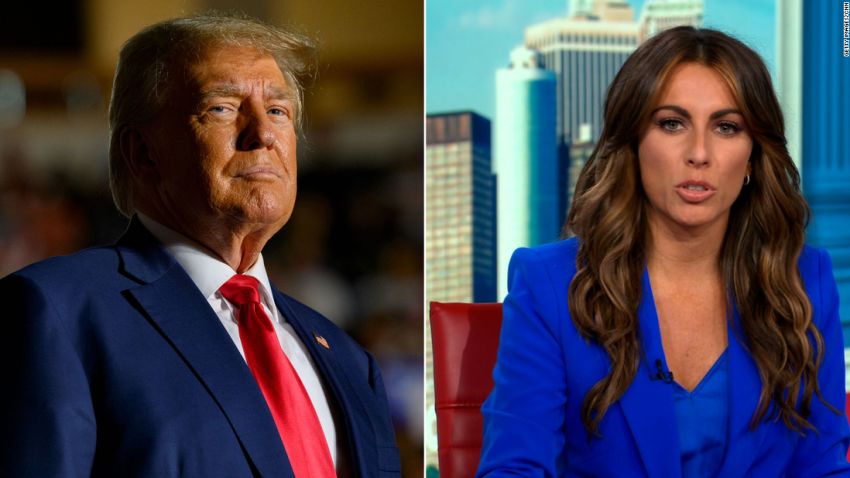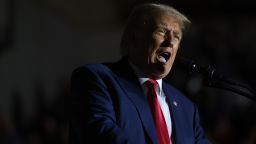Editor’s Note: Michael Gerhardt is the Burton Craige Distinguished Professor of Jurisprudence at the University of North Carolina School of Law. He is the author of several books, including the forthcoming “The Law of Presidential Impeachment.” The views expressed here are his own. Read more opinion on CNN.
Former President Donald Trump’s legal troubles got dramatically worse Tuesday, when he was indicted on criminal charges by a federal grand jury in special counsel Jack Smith’s investigation into efforts to overturn the 2020 election leading up to the January 6, 2021 attack on the US Capitol. Trump has now been indicted on nearly 80 felony counts and has dug himself into the deepest possible hole.

The ramifications of these charges for Trump and the country are enormous.
The most recent set of indictments — four felony counts leveled by Smith’s office — is bigger than Trump and bigger than anything his co-conspirators in the indictments might have done.
The trial, which may well happen before the next presidential election, will be about the battle to protect American democracy itself. So far, Trump has denied all wrongdoing and has pleaded not guilty to the previous charges.
The charges in the third indictment are the most serious yet against the former president. Experts consider the first set of indictments, 34 counts for business fraud brought by the Manhattan district attorney in March, to be technical and unusual, given that the underlying crime, campaign finance fraud, is a federal offense for which Trump has not been charged.
The second set of indictments, involving the handling of classified documents and including four additional charges in the superseding indictment released last week by Smith’s office, is undoubtedly serious, as 32 out of the 40 counts he faces in that indictment stem from the Espionage Act. But the third indictment goes further — for the first time — by charging Trump with criminal attempts to undermine American democracy.
The former president only has himself to blame for the misconduct he has been charged with, especially after having been repeatedly told by members of his staff, his Cabinet and state officials that there was no election fraud significant enough to affect the outcome of the election in 2020.
Trump’s Attorney General Bill Barr told the press, in early December 2020, that “we have not seen fraud on a scale” that could have produced a different outcome in the presidential election, and, in 2022, Barr testified before the January 6 House select committee that Trump was “detached from reality” in persistently fantasizing he had won the election. Trump 2020 campaign adviser Jason Miller even described some of the election fraud claims as “conspiracy shit beamed down from the mothership.”
According to the indictment, Trump knew his fraud claims were false “but the defendant repeated and widely disseminated them anyway — to make his knowingly false claims appear legitimate, create an intense atmosphere of mistrust and anger, and erode public faith in the administration of the election.”
Tuesday’s indictment does not charge Trump with being a bad loser, and it goes out of its way to acknowledge Trump had his First Amendment right to complain about the election. Instead, it makes a convincing case that Trump is singularly responsible for his own words and actions to subvert the constitutional mechanisms for the peaceful transfer of power.
In this newest set of charges, he finds himself before a judge who has spoken out strongly about the danger the nation faced due to the Jan. 6 riot. Trump is facing the possibility of more than 20 years of imprisonment if he is convicted on more than one of the recent indictments. On top of all that, his legal bills are straining his campaign’s finances.
The latest indictment exposes, like each of the other two, the absurdity of Trump’s defenses. Indeed, Trump’s defenses are screeds aimed at bucking up his political support, but none are legally significant, as he has claimed that the indictments are the product of a president and a Justice Department determined to weaponize the criminal justice system against him, that President Joe Biden and his son Hunter Biden are kingpins in the “Biden Crime Family” and committed crimes worse than he ever committed and that he was merely voicing criticisms of the electoral system that are protected by the First Amendment.
The third set of indictments is based on credible evidence of Trump’s conspiring to hinder or undo the final certification of the Electoral College votes in Congress. Indeed, the media closely covered Trump on January 6, including his incendiary speech telling his supporters, “you’ll never take back our country with weakness. You have to show strength, and you have to be strong.” The evidence and testimony laid out in the January 6 House select committee’s hearings are not imaginary or false; they plainly support the misconduct charged in the most recent indictment.
The indictment released Tuesday underscores the extent to which the Republican Party has abdicated its oft-repeated claims that it is the party of law and order and moral values. Many of the Republicans running for president alongside Trump have said or hinted they would likely pardon him in the federal indictments he now faces. A minority — former New Jersey Gov. Chris Christie, former Arkansas Gov. Asa Hutchinson and former Rep. Will Hurd of Texas — have expressly urged voters to turn away from a likely felon for president.
Each set of indictments tests the country’s commitment to the rule of law, which is the foundation of our democracy. This is especially true given the steadfast support Trump continues to enjoy among Republican voters. He’s polling at more than 50% in the Republican national primary polls — more than all his opponents combined.
But the rule of law is only meaningful if the law applies to everyone, including the mightiest among us. As President Theodore Roosevelt declared in his annual message to Congress in 1903, “No man is above the law, and no man is below; nor do we ask any man’s permission when we require him to obey it. Obedience to the law is demanded as a right; not asked for as a favor.”
The federal judge overseeing the criminal proceedings against Trump in the classified documents case denied a request from Trump to delay them until after the election. His lawyers had argued that he couldn’t get a fair trial while he was running for president.
Both a superior court judge and the Georgia Supreme Court have rejected Trump’s motions to stop a grand jury in Atlanta from considering indicting him for pressuring state officials to overturn the Georgia election.
Trump rightly failed, in other words, to get special treatment as a candidate for president.
By now, it should be familiar to everyone that Trump projects onto his political rivals his own misconduct. If, as Republicans argue, Hunter Biden is not entitled to any special treatment because he is the son of the president (nor should he be), the same goes for Trump.
Get Our Free Weekly Newsletter
- Sign up for CNN Opinion’s newsletter.
- Join us on Twitter and Facebook
Last but not least, Trump and his congressional allies are trying, mightily, to distract public attention by fuming about the conduct of Hunter Biden and indicating their desire to impeach Joe Biden.
The problem is that so far, there is no evidence of misconduct on the part of Joe Biden. In contrast, as each set of indictments shows, there is an abundance of actual evidence of Trump’s misconduct. The third and most recent set of indictments goes further than either of the other two, in showing how in several states, including Georgia, Michigan and Arizona, Trump attempted to undermine the integrity of the presidential election and thwart the will of the electorate.
With the newest indictment against Trump, the adage, familiar to all lawyers, seems especially applicable to the former president and his Republican allies in Congress: If the facts are not on your side, argue the law. If the law is not on your side, argue the facts. When neither the law nor the facts are on your side, pound the table.
Trump’s legal troubles have produced a lot of table-pounding, none of which will erase the expanding charges and evidence of his criminal misconduct.


